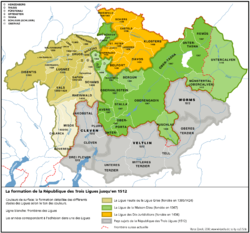Gray League
| Grey League | ||||||||||||||||||||
|
Grauer Bund (de) Lega Grigia (it) Ligia Grischa (rm) |
||||||||||||||||||||
| Associate of the Old Swiss Confederacy | ||||||||||||||||||||
|
||||||||||||||||||||
|
The Grey League, shown in shades of brown within the Three Leagues. The League of the Ten Jurisdictions is shown in orange, the League of God's House in green and subject territories, subsequently lost, in grey.
|
||||||||||||||||||||
| Capital | Ilanz | |||||||||||||||||||
| Government | Republic | |||||||||||||||||||
| Historical era | Middle Ages | |||||||||||||||||||
| • | Grey League founded | 1395 1395 | ||||||||||||||||||
| • | Government formed | March 16, 1424 | ||||||||||||||||||
| • | 1450 | |||||||||||||||||||
| • | Closer ties to Three Leagues and de facto independence (HRE) |
late 15th century |
||||||||||||||||||
| • |
Bundesbrief constitution for the Three Leagues |
September 23, 1524 |
||||||||||||||||||
| • | Annexed to the Helvetic Republic |
April 21, 1799 1799 |
||||||||||||||||||
|
||||||||||||||||||||
The Grey League (German: Grauer Bund, Italian: Lega Grigia, Romansh: Ligia Grischa or ![]() Lia Grischa ), sometimes called Oberbund, formed in 1395 in the Vorderrhein and Hinterrhein valleys, Raetia. The name Grey League is derived from the homespun grey clothes worn by the people. The league became part of the canton of Graubünden. The Grey League allied itself to the two other powers of Raetia in 1471, forming the Three Leagues. It was also an associate and ally of the Swiss Confederation and played a role in the build up to the Thirty Years' War.
Lia Grischa ), sometimes called Oberbund, formed in 1395 in the Vorderrhein and Hinterrhein valleys, Raetia. The name Grey League is derived from the homespun grey clothes worn by the people. The league became part of the canton of Graubünden. The Grey League allied itself to the two other powers of Raetia in 1471, forming the Three Leagues. It was also an associate and ally of the Swiss Confederation and played a role in the build up to the Thirty Years' War.
In the late twelfth century, the communities in the valleys in Raetia were generally small and independent. There were very few large landholders and no central authority. For years blood feuds and battles had raged between the Lords of Belmont, Werdenberg, Rhäzüns and the Bishop of Chur as well as minor nobles. The constant warfare had seriously damaged trade and transportation in the region. To reduce the violence and encourage trade, the leaders and nobles of the valleys proposed forming a league or alliance. This alliance was known as the Grey League.
...
Wikipedia



